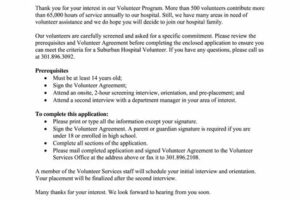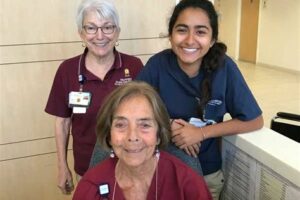Table of Contents
Hospital Chaplaincy Volunteers are dedicated individuals who offer spiritual support to patients, families, and healthcare staff in medical facilities. They provide comfort, solace, and guidance through prayer, counseling, and religious rituals. These compassionate volunteers play an integral role in promoting healing and addressing the emotional and spiritual needs of those facing illness or tragedy.
Hospital Chaplaincy Volunteers play a crucial role in providing compassionate care and support to patients and their families during times of illness and distress. Whether it’s offering a listening ear, providing spiritual guidance, or simply offering a comforting presence, these dedicated individuals go above and beyond to ensure that the emotional and spiritual needs of patients are met. In a healthcare setting where time is often limited and medical interventions take center stage, Hospital Chaplaincy Volunteers offer a much-needed source of solace and understanding. Their unwavering commitment to serving others shines through as they navigate the complex and often emotionally charged world of hospitals, bridging the gap between medicine and spirituality with grace and empathy.
The Unsung Heroes: Hospital Chaplaincy Volunteers
In the bustling hallways of hospitals, amidst the chaos and pain, there are unsung heroes working tirelessly to provide solace and support to patients and their families. These individuals, known as hospital chaplaincy volunteers, dedicate their time and energy to ensuring that those facing illness or injury find comfort and spiritual guidance during their stay. Let us delve into the world of these remarkable individuals and the invaluable role they play within the healthcare system.
A Beacon of Hope in Times of Despair
When patients and their loved ones enter a hospital, they often carry a sense of fear, uncertainty, and despair. Hospital chaplaincy volunteers serve as a beacon of hope, offering emotional support and a listening ear to those in need. Their presence brings a sense of calm and reassurance, reminding patients that they are not alone in their journey towards healing.
Spiritual Guidance for All Faiths
Hospital chaplaincy volunteers are trained to provide spiritual guidance and support to individuals from all religious backgrounds. Whether a patient follows a specific faith or practices spirituality in a more general sense, these volunteers are equipped to cater to their unique needs. Through prayer, meditation, or simply engaging in meaningful conversations, they help patients find strength and peace during challenging times.
Embracing Diversity and Cultural Sensitivity
One of the most remarkable aspects of hospital chaplaincy volunteers is their ability to embrace diversity and exhibit cultural sensitivity. They respect and honor the beliefs and traditions of every individual they encounter, creating an environment of inclusivity and understanding. This allows patients to feel comfortable expressing their spiritual needs without judgment or prejudice.
A Shoulder to Lean On
For many patients and their families, hospital chaplaincy volunteers become a pillar of support during times of crisis. These compassionate individuals offer a shoulder to lean on, lending a listening ear and providing comfort through difficult decisions, grief, and loss. They are there not only for patients but also for their loved ones, offering guidance and assistance in navigating the emotional rollercoaster of illness.
Providing Rituals and Sacraments
In addition to emotional support, hospital chaplaincy volunteers play a crucial role in providing religious rituals and sacraments to those who desire them. Whether it is administering religious sacraments, performing blessings, or facilitating prayer services, these volunteers ensure that patients have the opportunity to practice their faith and find solace within their religious traditions.
Training and Qualifications
Hospital chaplaincy volunteers undergo comprehensive training programs to equip them with the necessary skills and knowledge to serve effectively. These programs often include coursework in pastoral care, ethics, and cultural competency. Volunteers may also receive specialized training in areas such as palliative care, grief counseling, or chaplaincy within specific religious denominations.
A Collaborative Effort
The work of hospital chaplaincy volunteers does not happen in isolation. They form an integral part of the healthcare team, collaborating with medical staff, social workers, and psychologists to provide holistic care to patients. By working together, they address not only the physical aspects of healing but also the emotional and spiritual dimensions.
The Rewards of Volunteerism
While hospital chaplaincy volunteers dedicate their time and energy selflessly, they also reap personal rewards from their service. Witnessing the positive impact they make in the lives of patients and their families brings a sense of fulfillment and purpose. The gratitude expressed by those they serve acts as a constant reminder of the profound difference they are capable of making.
Becoming a Hospital Chaplaincy Volunteer
If you are inspired by the work of hospital chaplaincy volunteers and would like to contribute to the well-being of others, consider becoming one yourself. Reach out to your local hospitals or healthcare organizations to inquire about volunteer opportunities. Through your compassion and dedication, you can help create a haven of hope and support for those in need.
In conclusion, hospital chaplaincy volunteers are truly the unsung heroes within healthcare settings. Their unwavering commitment to providing spiritual guidance, emotional support, and a comforting presence is invaluable to patients and their families. Let us appreciate and recognize these remarkable individuals for their selfless service, as they continue to bring light to the darkest corners of our hospitals.
The Role of Hospital Chaplaincy Volunteers in Providing Spiritual Support and Comfort
Introduction to Hospital Chaplaincy Volunteers: Hospital chaplaincy volunteers play a crucial role in providing spiritual support and comfort to patients and their families within healthcare settings. These dedicated individuals offer a compassionate presence, listening ear, and a source of hope and encouragement during times of crisis and vulnerability.
The Importance of Emotional and Spiritual Support: Hospital chaplaincy volunteers recognize the significance of addressing not only physical ailments but also the emotional and spiritual well-being of patients. Through their empathetic and non-judgmental approach, they offer a safe space for individuals to express their fears, doubts, and hopes, providing comfort and solace during difficult times.
Training and Qualifications: To effectively serve as hospital chaplaincy volunteers, individuals undergo specialized training programs that equip them with the necessary skills and sensitivity to work with diverse religious beliefs and cultural backgrounds. These programs emphasize active listening, crisis intervention, and ethical considerations when dealing with patient confidentiality and privacy.
Providing Religious and Non-Religious Support: Hospital chaplaincy volunteers are trained to offer religious support, praying with patients and conducting religious rituals according to their needs and beliefs. However, they are also mindful of those who identify as non-religious, ensuring that they receive compassionate care and support tailored to their personal philosophies and values.
Supporting the Grieving Process: In times of loss and grief, hospital chaplaincy volunteers provide a compassionate presence that aids individuals and families through their mourning process. They offer spiritual rituals, memorial services, and bereavement support, allowing people to find solace and come to terms with their grief within the hospital environment.
Collaborating with Healthcare Professionals: Hospital chaplaincy volunteers work collaboratively with healthcare professionals, such as doctors, nurses, and therapists, to ensure comprehensive support for patients and their families. This collaboration fosters a holistic approach to healthcare, addressing not only physical ailments but also emotional and spiritual needs.
Bringing Comfort in Ethical Dilemmas: Volunteer chaplains often encounter ethical dilemmas within healthcare settings and work as part of an interdisciplinary team to provide guidance and comfort for patients and families facing difficult decisions. Their presence and expertise contribute to ensuring that moral considerations are addressed, empowering individuals to make well-informed choices.
Strengthening the Support Networks: By actively engaging with patients, their families, and the hospital community, chaplaincy volunteers contribute to building and strengthening support networks within healthcare institutions. They work towards fostering a sense of connectedness, understanding, and shared humanity, promoting healing and resilience throughout the hospital environment.
In the field of healthcare, Hospital Chaplaincy Volunteers play a vital role in providing spiritual and emotional support to patients, their families, and even hospital staff. These compassionate individuals dedicate their time and energy to serve as a source of comfort, guidance, and solace during challenging times. Here is an overview of the significance and impact of Hospital Chaplaincy Volunteers:
1. Fulfilling a spiritual need:
Hospital Chaplaincy Volunteers recognize the importance of addressing the spiritual needs of patients, regardless of their religious beliefs or affiliations. They provide a listening ear, offer prayers, and engage in meaningful conversations that help individuals find strength, hope, and inner peace.
2. Promoting holistic healing:
By tending to the spiritual well-being of patients, these volunteers contribute to the overall healing process. They understand that physical recovery is not the sole aspect of wellness and that attending to the emotional and spiritual aspects can greatly impact a patient’s well-being.
3. Supporting families in crisis:
During times of medical emergencies or critical conditions, families often experience immense stress and uncertainty. Hospital Chaplaincy Volunteers offer a comforting presence and a source of support to family members, guiding them through difficult decisions, providing solace, and helping them cope with the emotional strain.
4. Assisting hospital staff:
These volunteers not only focus on patient care but also support the hospital staff. They understand the demanding nature of healthcare work and offer a listening ear and encouragement to nurses, doctors, and other professionals. By doing so, they contribute to the overall well-being and morale of the hospital community.
5. Cultural and religious sensitivity:
Hospital Chaplaincy Volunteers are trained to respect and appreciate the diverse cultural and religious backgrounds of patients. They strive to create an inclusive environment where individuals feel comfortable expressing their beliefs, rituals, and practices. This sensitivity helps foster a sense of belonging and ensures that everyone receives support tailored to their specific needs.
6. Enhancing patient experience:
The presence of Hospital Chaplaincy Volunteers significantly enhances the overall patient experience within healthcare settings. Their compassionate and empathetic approach helps alleviate anxiety, fear, and loneliness that patients may experience during their hospital stay. Through their support, patients often feel valued, heard, and understood.
7. Facilitating grief and bereavement:
When patients face terminal illnesses or loss, Hospital Chaplaincy Volunteers play a crucial role in providing comfort and guidance during the grieving process. They assist with funeral or memorial arrangements, provide emotional support to bereaved families, and offer ongoing counseling to help individuals navigate their grief journey.
Overall, Hospital Chaplaincy Volunteers are an indispensable asset to healthcare institutions. Their dedication, empathy, and commitment to serving others contribute to the holistic well-being of patients, families, and hospital staff alike, ensuring that spiritual and emotional needs are met during times of vulnerability and crisis.
Thank you for taking the time to explore the fascinating world of Hospital Chaplaincy Volunteers with us. We hope that this article has shed some light on the crucial role these dedicated individuals play in providing emotional and spiritual support to patients, their families, and medical staff in hospitals across the globe.
As we have discovered, Hospital Chaplaincy Volunteers are a diverse group of individuals from various backgrounds and faiths who come together with a common purpose – to offer comfort, compassion, and a listening ear to those in need. Whether it is through prayer, religious rituals, or simply lending an empathetic presence, these volunteers bring a sense of solace and hope to individuals navigating the challenging journey of illness and healing.
Their selfless dedication and ability to connect with people on a deeply personal level make Hospital Chaplaincy Volunteers an invaluable part of the healthcare system. They provide a unique form of support that complements the medical treatment patients receive, addressing the emotional and spiritual aspects of their well-being. By offering a non-judgmental space for individuals to express their fears, doubts, and hopes, these volunteers help patients find strength, resilience, and a renewed sense of purpose.
In conclusion, the work of Hospital Chaplaincy Volunteers is truly awe-inspiring. Their unwavering commitment to serving others in their most vulnerable moments is a testament to the power of compassion and human connection. As we navigate the complexities of modern healthcare, it is vital that we continue to recognize and support the invaluable contributions of these volunteers.
Whether you are considering becoming a Hospital Chaplaincy Volunteer yourself or simply seeking to understand more about this vital role, we hope that this article has sparked your interest and provided you with valuable insights. The world of Hospital Chaplaincy Volunteers is a rich tapestry of stories, experiences, and profound moments of connection. We encourage you to delve deeper into this fascinating field and explore the countless ways in which these remarkable individuals are making a difference in the lives of patients, families, and medical professionals alike.
Thank you once again for joining us on this exploration of Hospital Chaplaincy Volunteers. We look forward to continuing to share stories and insights that inspire and uplift, as we celebrate the incredible impact these volunteers have in the realm of healthcare.
.
People also ask about Hospital Chaplaincy Volunteers:
What is the role of a hospital chaplaincy volunteer?
How can I become a hospital chaplaincy volunteer?
What qualifications do I need to volunteer as a hospital chaplaincy volunteer?
Do hospital chaplaincy volunteers receive any training?
What are the benefits of volunteering as a hospital chaplaincy volunteer?
Journalist Voice and Tone:
1. What is the role of a hospital chaplaincy volunteer?
A hospital chaplaincy volunteer plays a vital role in providing spiritual and emotional support to patients, their families, and hospital staff. They offer counseling, prayer, and companionship to individuals facing illness, trauma, or end-of-life situations.
2. How can I become a hospital chaplaincy volunteer?
To become a hospital chaplaincy volunteer, you can typically start by contacting the hospital’s chaplaincy department or volunteer services office. They will guide you through the application process, which may involve filling out an application form, undergoing a background check, and attending an interview.
3. What qualifications do I need to volunteer as a hospital chaplaincy volunteer?
The qualifications to volunteer as a hospital chaplaincy volunteer may vary depending on the hospital or organization. Generally, volunteers should possess good communication and interpersonal skills, empathy, and a non-judgmental attitude. Some hospitals may require volunteers to have completed specific training or have a religious affiliation, although this may not be a universal requirement.
4. Do hospital chaplaincy volunteers receive any training?
Yes, most hospitals provide training programs for their chaplaincy volunteers. This training typically covers topics such as active listening, cultural sensitivity, ethical guidelines, and understanding different religious beliefs. The aim is to equip volunteers with the necessary skills to effectively support patients and their families during challenging times.
5. What are the benefits of volunteering as a hospital chaplaincy volunteer?
Volunteering as a hospital chaplaincy volunteer can be a deeply fulfilling experience. It offers an opportunity to make a positive impact on people’s lives during difficult moments. Volunteers often report a sense of personal growth, increased compassion, and a greater understanding of diverse cultures and beliefs. Additionally, volunteering can provide valuable insights into the healthcare system and potentially lead to further career opportunities in chaplaincy or related fields.






